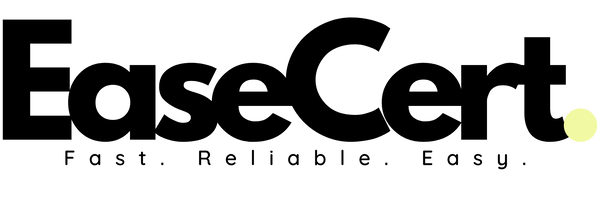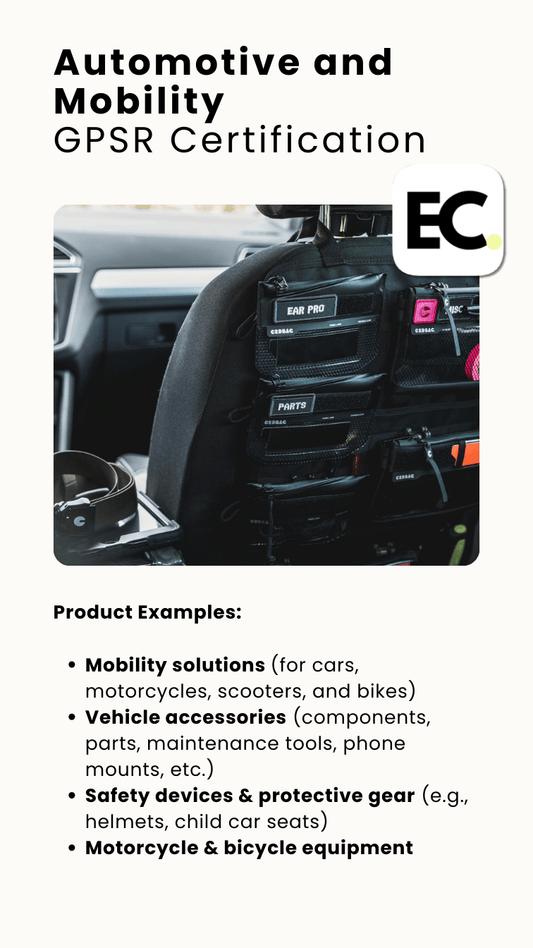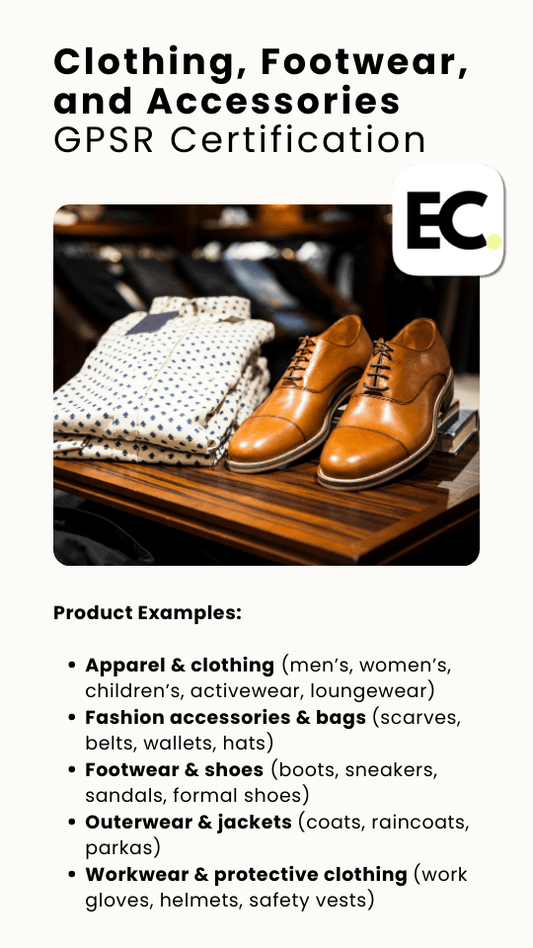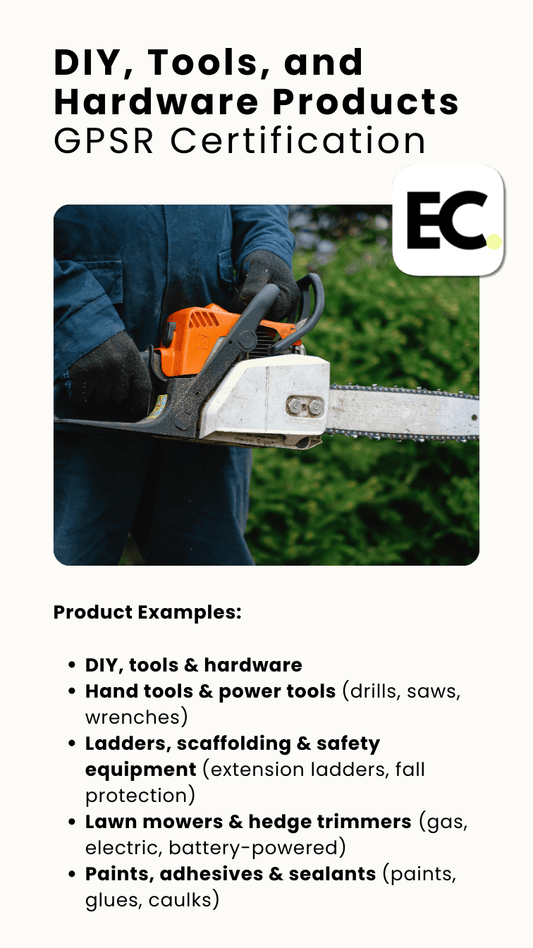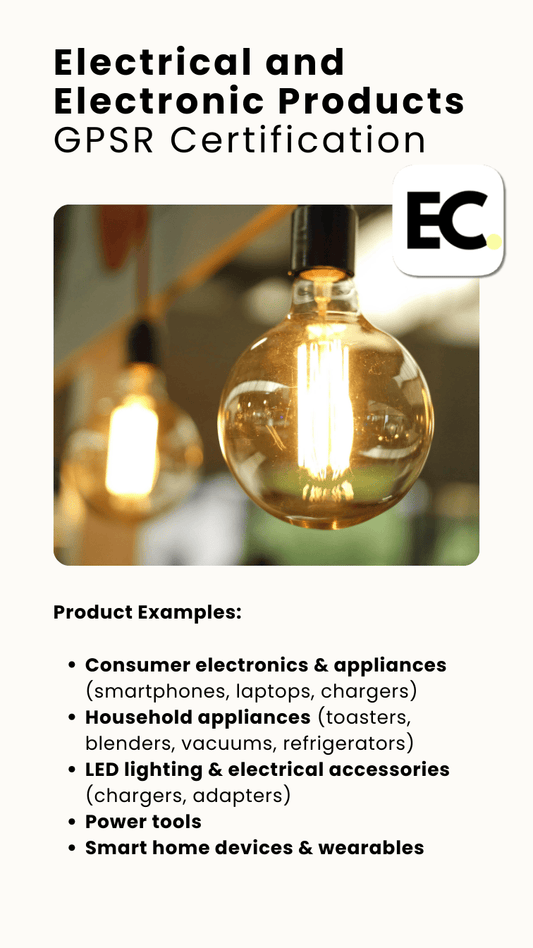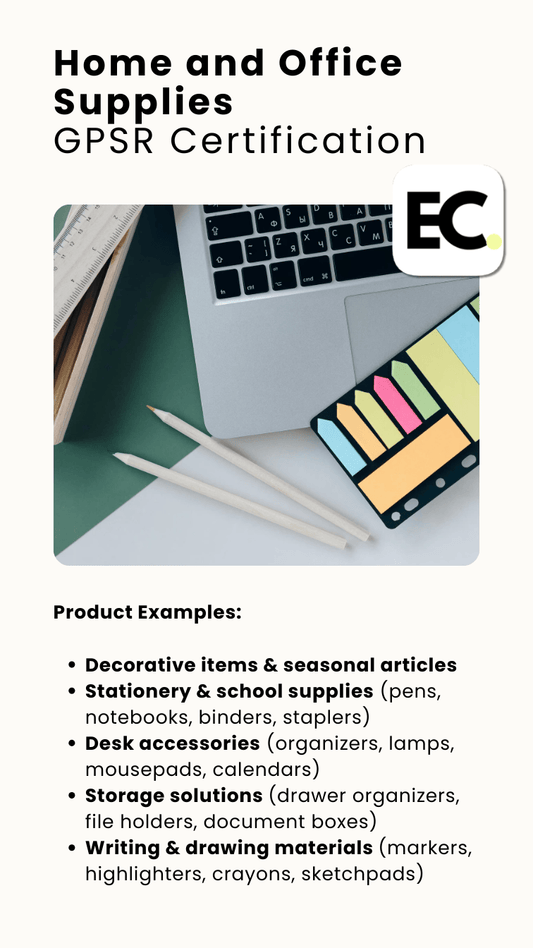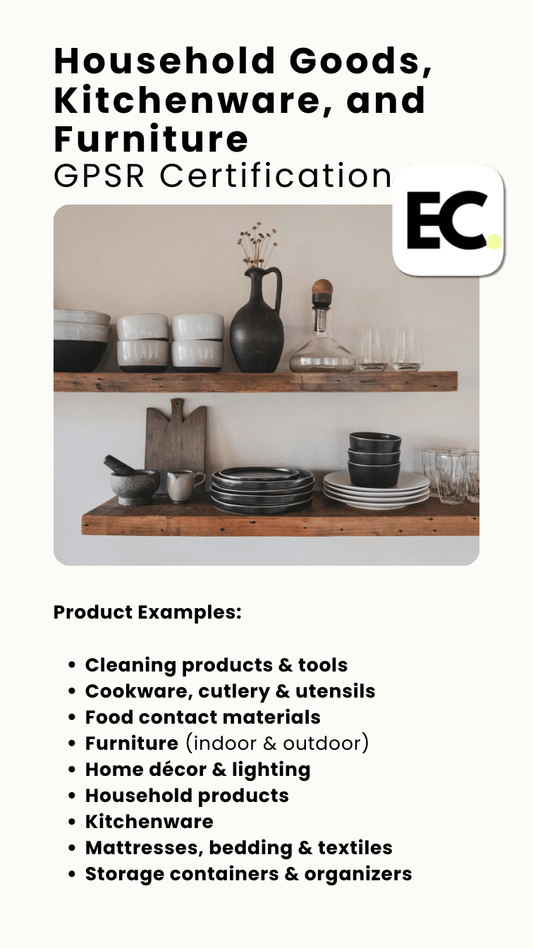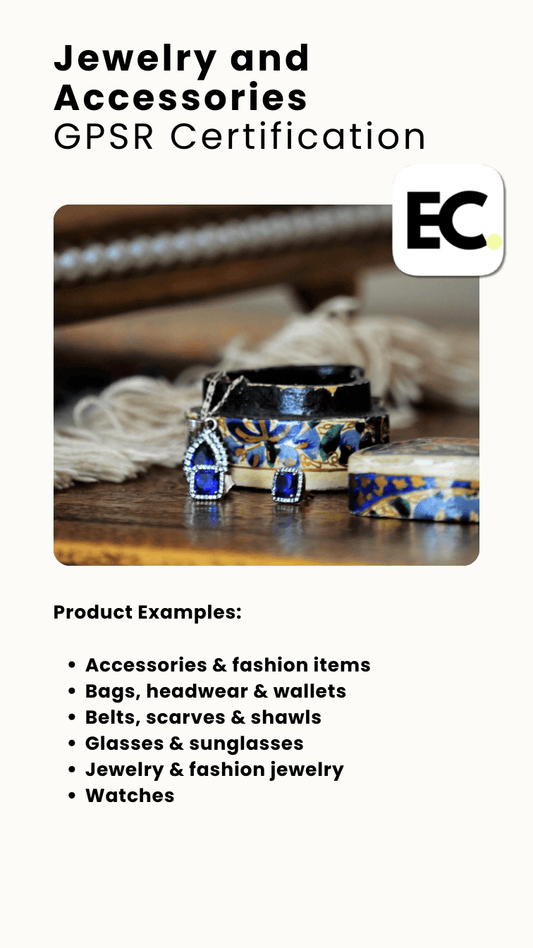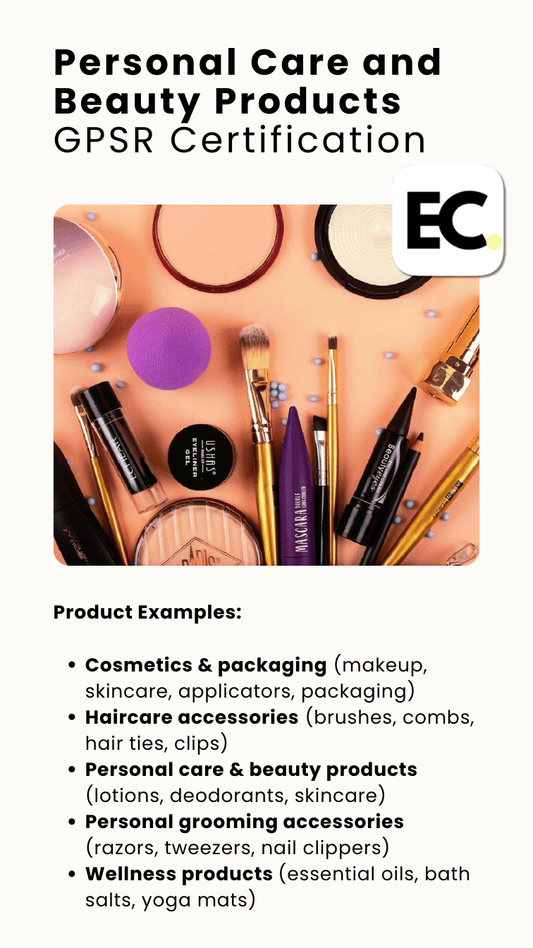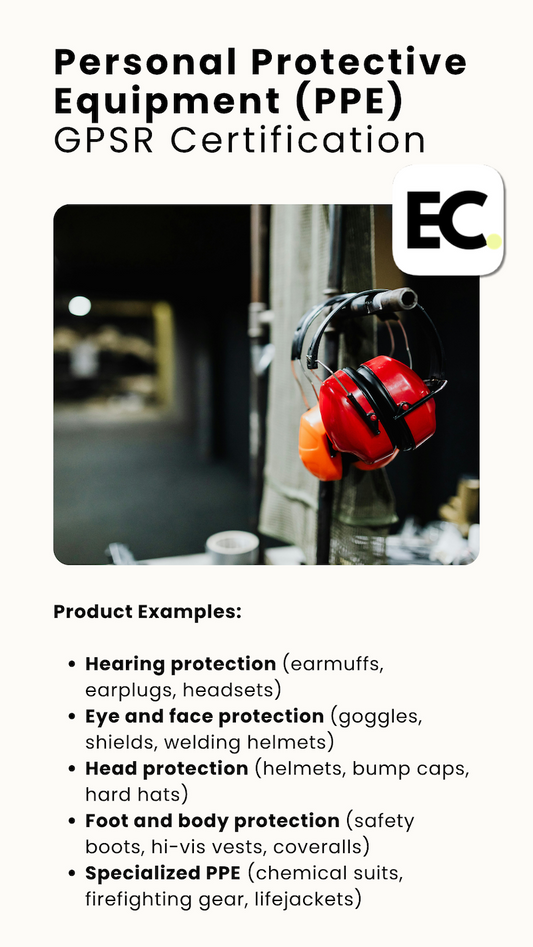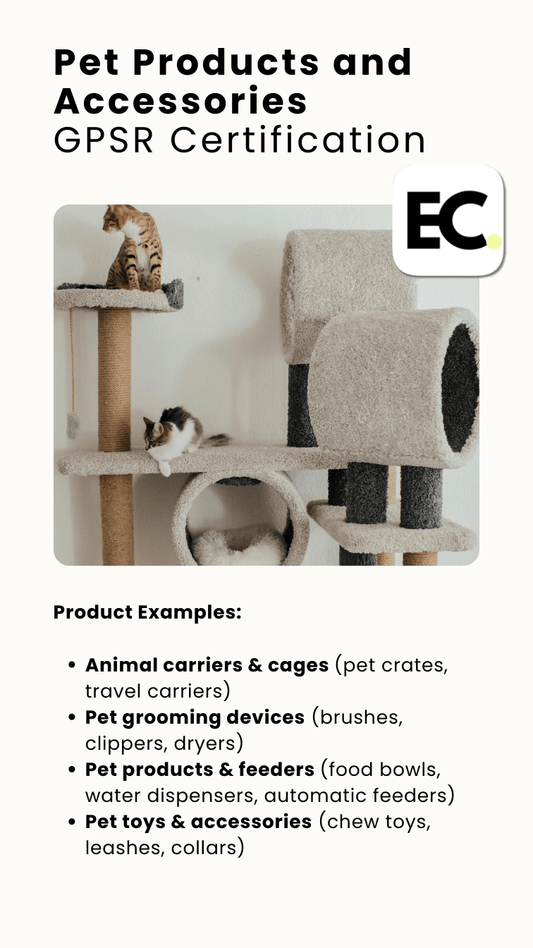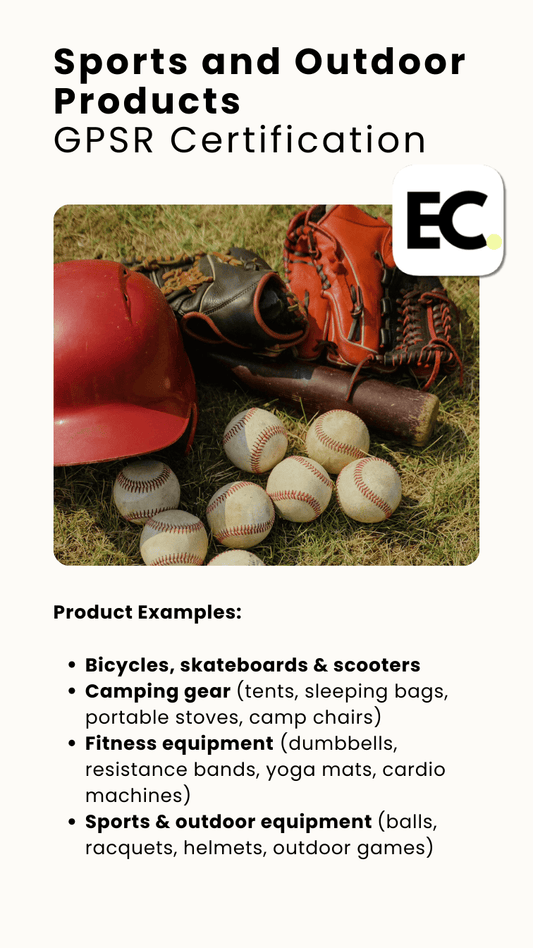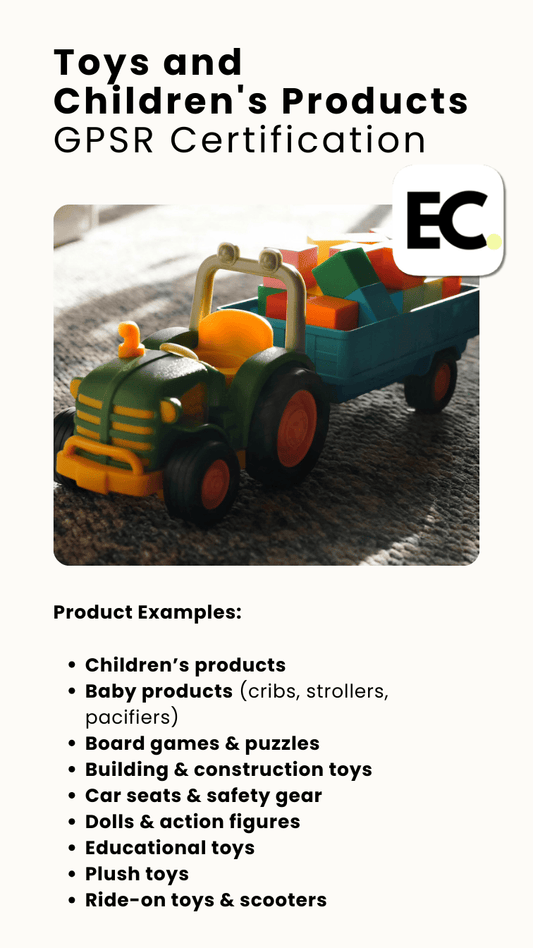
Comprehensive GPSR Compliance Services for EU Market Access
EaseCert provides complete support to help you meet all requirements under the EU General Product Safety Regulation for a one-time, all-inclusive fee.
We cover everything from risk assessments to identify and mitigate safety hazards, to GPSR product certification and EU labelling compliance. We also manage full traceability and technical documentation, act as your EU Authorised Representative / Responsible Person, and assist with EU Safety Gate registration for online sellers.

Identify hazards. Mitigate risks.
1. Risk Assessment
We conduct a thorough risk analysis to identify potential safety hazards associated with your product. Our experts provide detailed mitigation strategies to ensure compliance with the General Product Safety Regulation.

Certified. Compliant. Ready.
2. GPSR Certification
We guide you through the GPSR certification process, ensuring your product meets all EU safety and compliance requirements. This includes conformity assessments, documentation, and regulatory guidance.

Labelled. Aligned. Approved.
3. Product Labelling
GPSR establishes overarching standards for product labels. We verify that your product labelling aligns with EU requirements, including proper safety warnings, usage instructions, and compliance markings.

Documented. Traceable. Compliant.
4. Traceability and Documentation
We create, review, and store the required compliance documentation for market surveillance as Digital Product Passport, including technical files, declarations of conformity, and record-keeping.
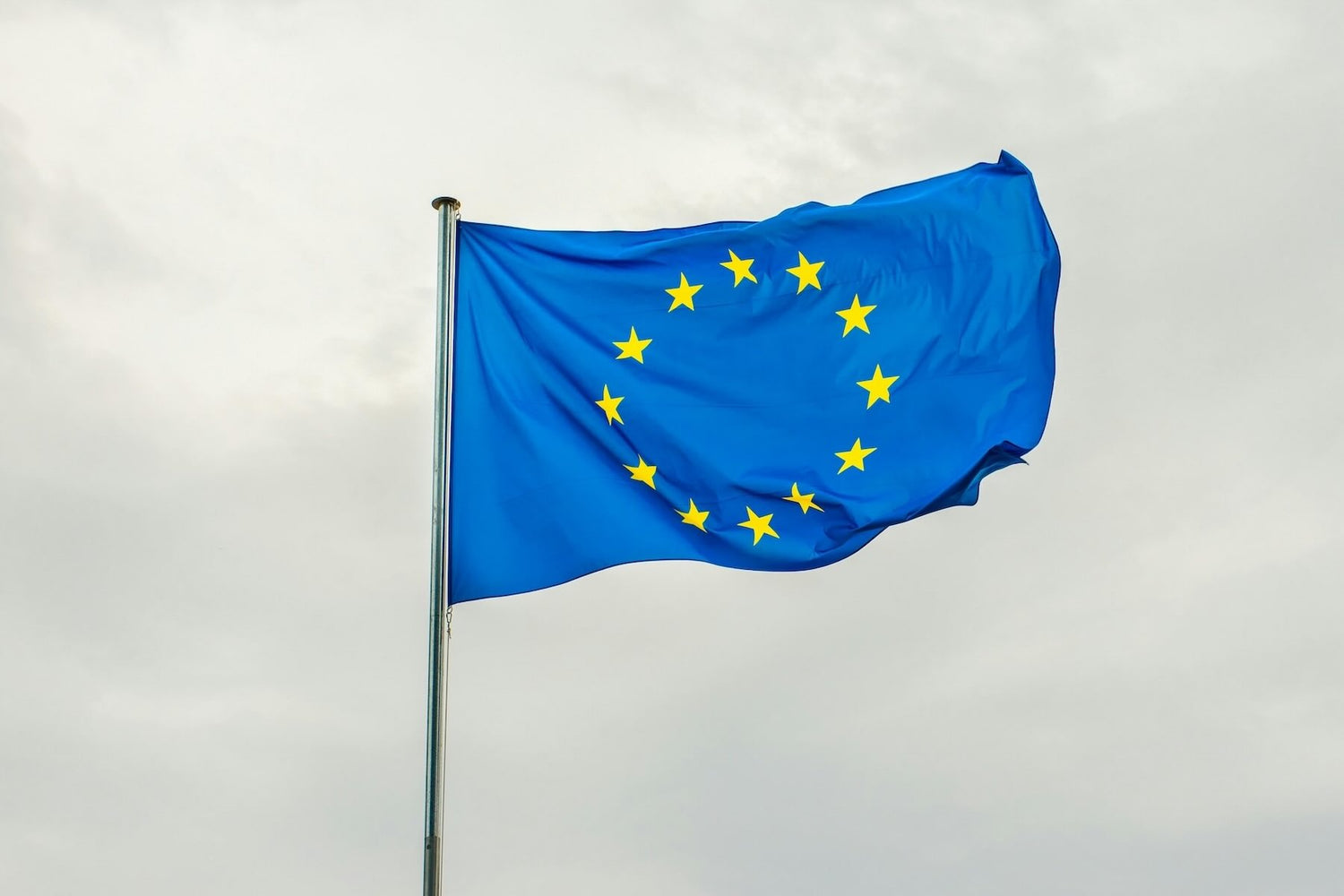
Represented. Compliant. Connected.
5. EU Responsible Person
For businesses outside the EU, we act as your legally required EU Authorised Representative / Responsible Person. This ensures compliance with GPSR regulations and provides a point of contact for EU authorities regarding product safety.
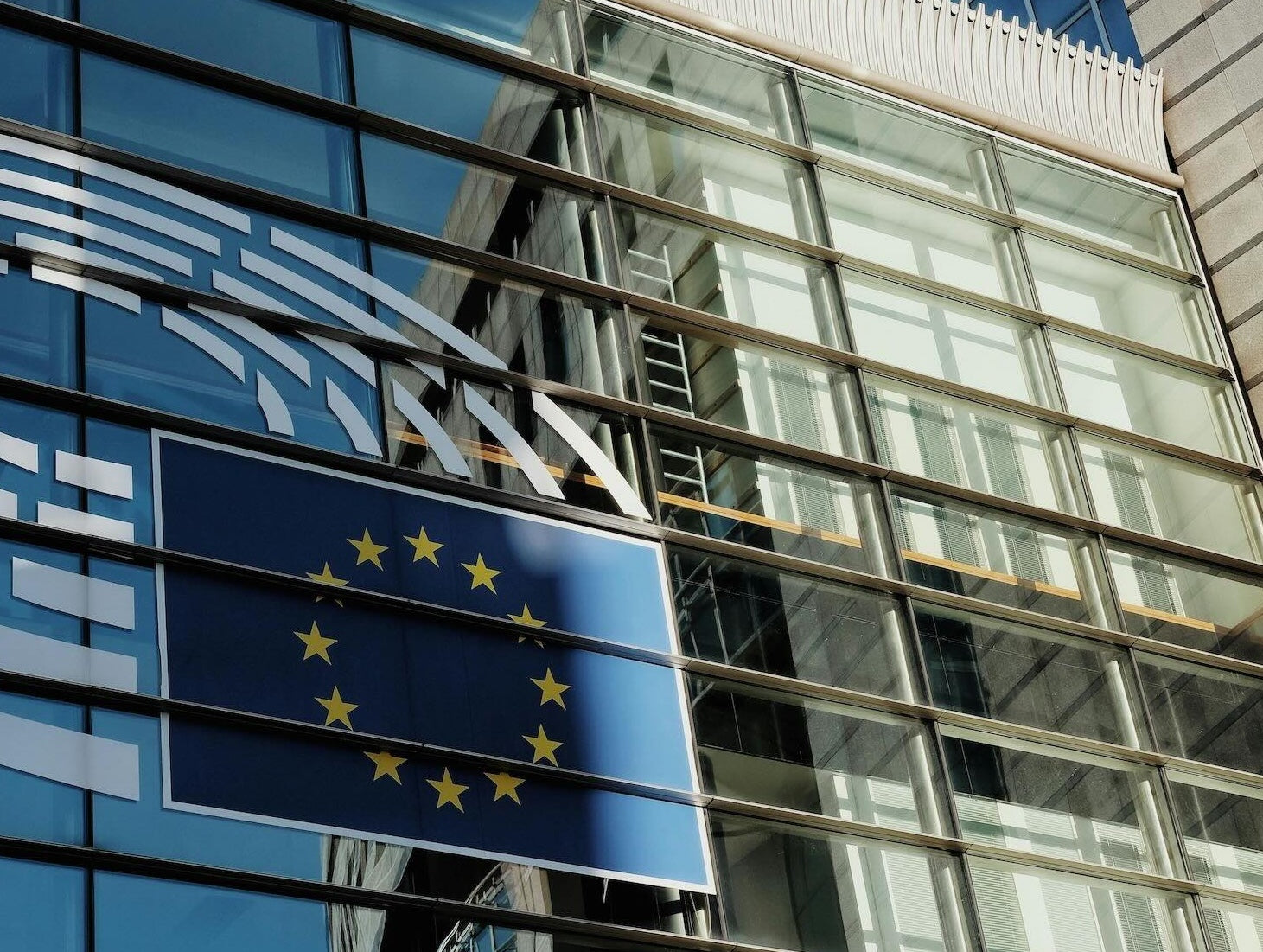
Registered. Listed. Compliant.
6. Safety Gate Registration
If you operate an online marketplace, you are required by law to register your business. We assist in registering your business with the EU Safety Gate Portal to ensure compliance with online marketplace regulations.
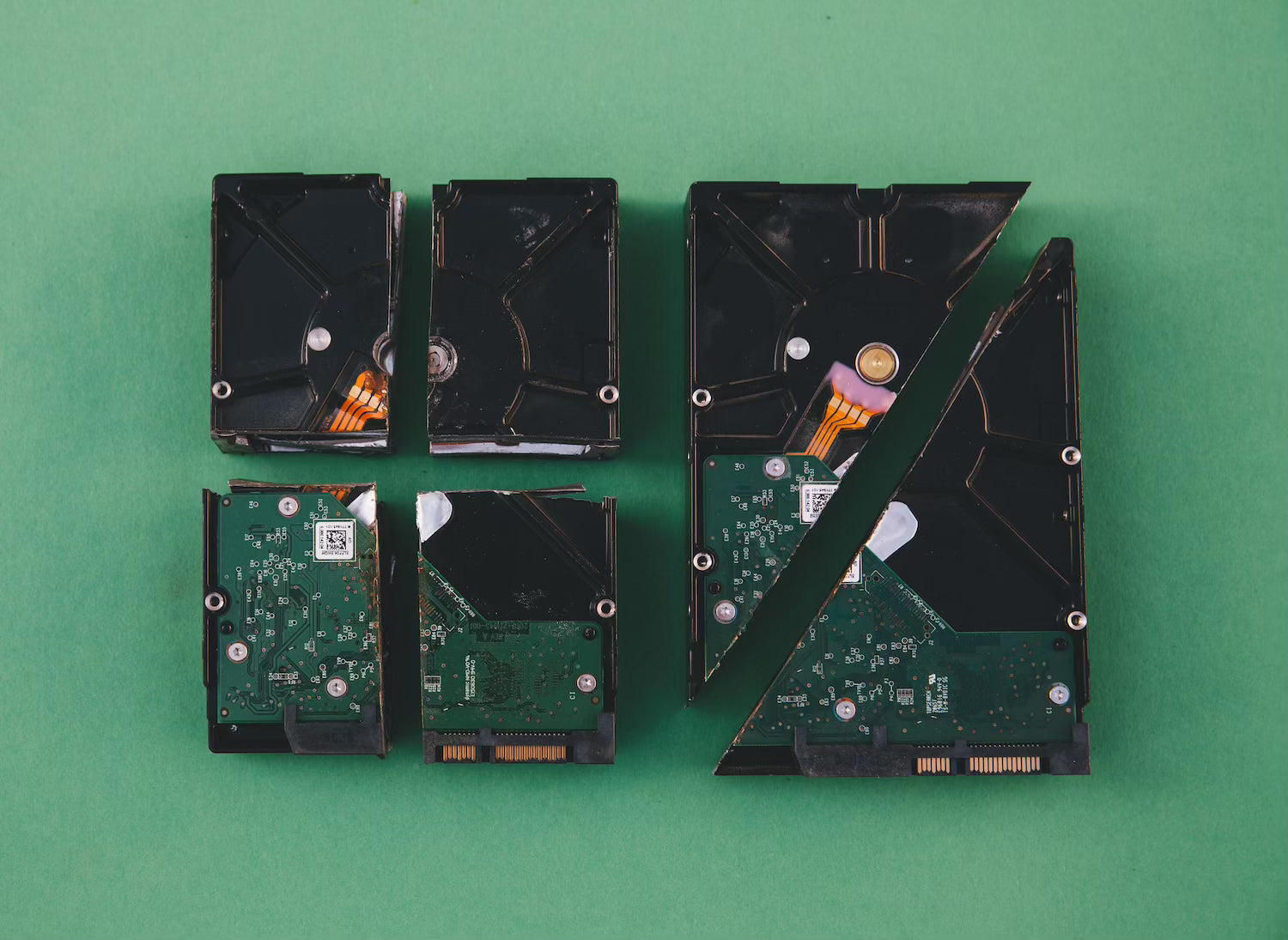
Declared. Labelled. Market-compliant.
7. WEEE Registration & Compliance
Support with Waste Electrical and Electronic Equipment (WEEE) registration for selling electronics in the EU. Includes producer registration, authorized representative service, reporting, and labeling compliance.

Registered. Enrolled. Market-ready.
8. LUCID Registration
Assistance with registration under the German Packaging Act (VerpackG), including LUCID Packaging Register setup, system participation, labeling requirements, and ongoing compliance support for packaging placed on the German market.

Compliant. Marked. Approved.
9. France Triman (Info-Tri) Labelling
France’s Triman (Info-Tri) labelling is required under AGEC and EPR. Learn who must apply it, how Citeo and UIN registration work, and how to stay compliant.

One Fee. Lifetime Coverage.
10. One-Time Fee
Unlike other service providers, EaseCert charges a one-time fee for all services. Once certified, we remain your EU Representative for as long as your product is on the market - no annual renewals, no subscriptions.
GPSR (EU) 2023/988
The General Product Safety Regulation (GPSR) (EU) 2023/988 replaces the previous General Product Safety Directive (GPSD) 2001/95/EC and establishes updated safety requirements for non-food consumer products sold in the EU. The regulation applies from December 13, 2024, and aligns EU product safety rules with e-commerce developments, new technologies, and increased consumer protection needs.
Sections of GPSR (EU) 2023/988 in Detail
Chapter I: General Provisions (Articles 1-4)
• Defines the scope of the regulation, covering all non-food consumer products unless sector-specific legislation applies.
• Establishes the regulation’s objective: ensuring product safety in the EU market.
• Introduces key definitions, including “economic operators” (manufacturer, importer, distributor) and “product safety.”
Chapter II: General Product Safety Requirements (Articles 5-10)
• Products must be safe under normal or foreseeable use.
• A risk assessment must be performed, considering factors like:
• Product characteristics (composition, packaging, instructions)
• Effect on specific consumer groups (e.g., children, elderly, disabled)
• Potential cybersecurity risks
• Compliance with harmonized standards and EU legislation.
• Market surveillance authorities can request proof of compliance from businesses.
Chapter III: Obligations of Economic Operators (Articles 11-18)
This chapter sets specific responsibilities for manufacturers, importers, distributors, and online marketplaces.
1. Manufacturer Obligations (Article 11)
• Ensure product design, manufacturing, and testing comply with safety requirements.
• Provide clear identification (name, address, contact details) on the product or packaging.
• Supply necessary instructions and warnings in the required languages.
• Maintain technical documentation to demonstrate safety.
• Implement a corrective action plan if risks are discovered.
2. Importer Obligations (Article 12)
Importers must:
• Verify that manufacturers meet GPSR safety requirements.
• Ensure products are CE-marked (if applicable) and include correct documentation.
• Keep a record of technical documentation and risk assessments.
• Monitor safety issues and notify authorities if unsafe products are identified.
• Cooperate with market surveillance authorities and take corrective actions.
3. Distributor Obligations (Article 13)
Distributors must:
• Ensure the product has a manufacturer’s name, contact details, and safety instructions.
• Verify that products are not subject to safety recalls.
• Stop selling a product if there is a serious risk and notify authorities.
4. Online Marketplaces (Article 14)
• New rules apply to Amazon, eBay, AliExpress, and other platforms selling to EU consumers.
• Marketplaces must ensure traceability of sellers and assist in product recalls.
• Platforms must respond to authority requests within two working days.
Chapter IV: Product Safety Incident Management (Articles 19-22)
• Manufacturers and importers must notify national authorities if a product poses a serious risk.
• The European Commission can issue Union-wide product recalls if necessary.
• A Safety Gate Rapid Alert System allows EU-wide notifications of unsafe products.
Chapter V: Market Surveillance and Enforcement (Articles 23-31)
• Market surveillance authorities (e.g., customs, national regulators) can conduct inspections, test products, and request corrective actions.
• Penalties for non-compliance include fines, product bans, and recalls.
Chapter VI: Digital Product Safety & Emerging Risks (Articles 32-38)
• Introduces cybersecurity and AI-related product safety requirements.
• Focuses on connected products (IoT) and risks associated with hacking or data breaches.
• Ensures AI-based consumer products follow algorithm transparency rules.
Chapter VII: Final Provisions (Articles 39-46)
• Establishes cooperation rules among EU countries.
• Outlines transition periods for businesses.
• Confirms full enforcement starts on December 13, 2024.
What Importers into the EU Must Do
Importers have critical responsibilities to ensure compliance with GPSR 2023/988 before placing products on the EU market:
1. Verify Manufacturer Compliance
• Ensure products meet EU safety standards.
• Check that technical documentation, risk assessments, and conformity markings are in place.
2. Labeling & Documentation
• Ensure the product displays:
• Manufacturer’s name & address
• Importer’s name & contact details
• Safety instructions and warnings (in the correct language).
3. Monitor Product Safety
• Conduct regular checks and audits of supplier compliance.
• Report any serious risks to EU authorities within two working days.
4. Cooperate with Market Surveillance
• Provide documentation upon request.
• Assist in recalls or corrective actions.
5. Ensure Online & E-commerce Compliance
• Verify compliance for online sales and cross-border shipments.
• Work with platforms to remove unsafe products quickly.
Risks of Non-Compliance
Failure to comply with GPSR can lead to significant consequences:
1. Fines & Penalties
• EU authorities can impose fines proportional to the product’s risk.
• Non-compliance with a recall order could lead to higher penalties.
2. Product Recalls & Bans
• Unsafe products may be removed from the EU market.
• Companies may be forced to recall already sold products.
3. Loss of Market Access
• Authorities may block imports at customs.
• Online marketplaces may de-list non-compliant sellers.
4. Legal & Reputational Damage
• Consumer lawsuits or complaints could harm the company’s brand.
• Loss of trust from distributors, retailers, and buyers.
Conclusion
GPSR (EU) 2023/988 brings stricter safety rules for non-food consumer products, focusing on risk assessments, digital product safety, and e-commerce enforcement. Importers play a crucial role in ensuring compliance before products enter the EU market. Non-compliance can result in fines, recalls, and permanent market bans, making adherence to the regulation essential.
Learn More About GPSR:
Our Product Certification Services:
-
Automotive and Mobility GPSR Certification
Regular price €500,00 EURRegular priceUnit price / per -
Clothing, Footwear, and Accessories GPSR Certification
Regular price €400,00 EURRegular priceUnit price / per -
DIY, Tools, and Hardware Products GPSR Certification
Regular price €500,00 EURRegular priceUnit price / per -
Electrical and Electronic Products GPSR Certification
Regular price €500,00 EURRegular priceUnit price / per -
Home and Office Supplies GPSR Certification
Regular price €400,00 EURRegular priceUnit price / per -
Household Goods, Kitchenware, and Furniture GPSR Certification
Regular price €500,00 EURRegular priceUnit price / per -
Jewelry and Accessories GPSR Certification
Regular price €400,00 EURRegular priceUnit price / per -
Personal Care and Beauty Products GPSR Certification
Regular price €500,00 EURRegular priceUnit price / per -
Personal Protective Equipment (PPE) GPSR Certification
Regular price €600,00 EURRegular priceUnit price / per -
Pet Products and Accessories GPSR Certification
Regular price €400,00 EURRegular priceUnit price / per -
Sports and Outdoor Products GPSR Certification
Regular price €400,00 EURRegular priceUnit price / per -
Toys and Children's Products GPSR Certification
Regular price €500,00 EURRegular priceUnit price / per
